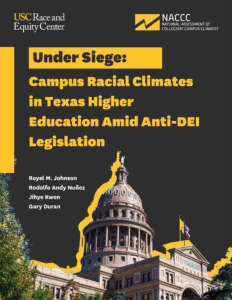Today, the USC Race and Equity Center unveiled a new report examining the potential far-reaching implications of Senate Bill 17 (SB 17) on marginalized students in Texas higher education.
 Titled Under Seige: Campus Racial Climate in Texas Higher Education Amid Anti-DEI Legislation, the report highlights the significant challenges faced by students of color and LGBTQ+ students at public institutions across the state.
Titled Under Seige: Campus Racial Climate in Texas Higher Education Amid Anti-DEI Legislation, the report highlights the significant challenges faced by students of color and LGBTQ+ students at public institutions across the state.
Released as the first year under SB 17 draws to a close, the report provides critical baseline data on campus racial climates at public higher education institutions in Texas prior to the law’s implementation. SB 17 effectively eliminates Diversity, Equity, and Inclusion (DEI) programming in Texas higher education institutions. Drawing on comprehensive survey data from the National Assessment of Collegiate Campus Climates (NACCC), the findings reveal stark disparities in academic and emotional well-being for students of color, who reported significant declines in their academic performance and emotional health due to hostile campus climates.
The report also uncovers a pervasive sense of frustration and anger among students about the state of racial equity on their campuses. Marginalized groups, particularly students of color and LGBTQ+ students, disproportionately expressed feeling unwelcome and unsafe, highlighting systemic failures to foster a supportive and inclusive campus environment. Furthermore, the report highlights the critical role diverse educators play in fostering belonging and addressing these inequities, a resource now under threat due to the restrictions imposed by SB 17.
“This report provides a clear, evidence-based analysis of what’s at stake—not just in Texas, but across the country where DEI is under attack,” said Royel Johnson. “The reality is that most predominantly white institutions have already been struggling to cultivate inclusive and welcoming campuses for all students. SB 17 and similar legislative measures have already rolled back progress and will continue to do so.”
The findings paint a sobering picture of the challenges ahead, but they also serve as a reminder of the urgent need for action to support marginalized students and preserve the progress made in advancing DEI in higher education.